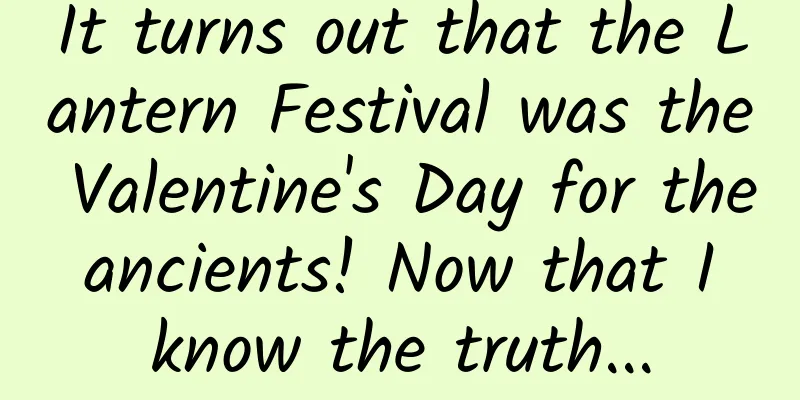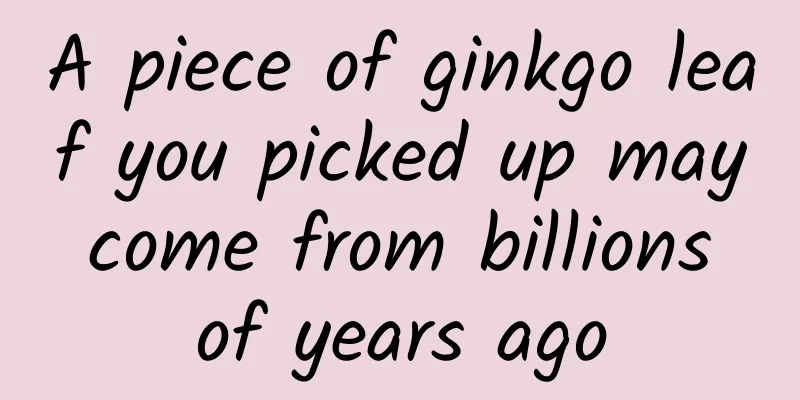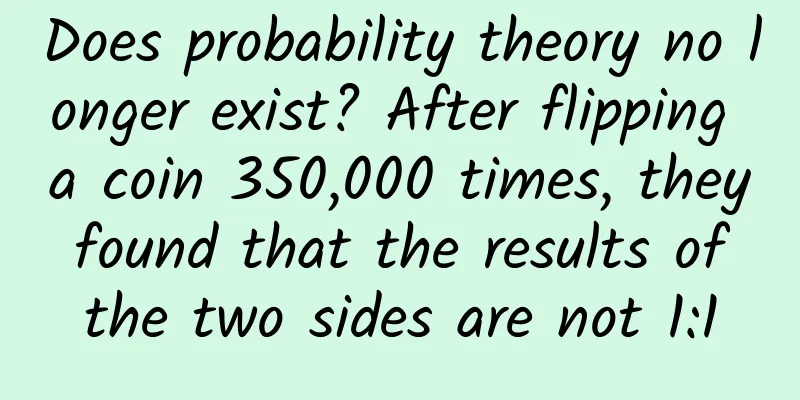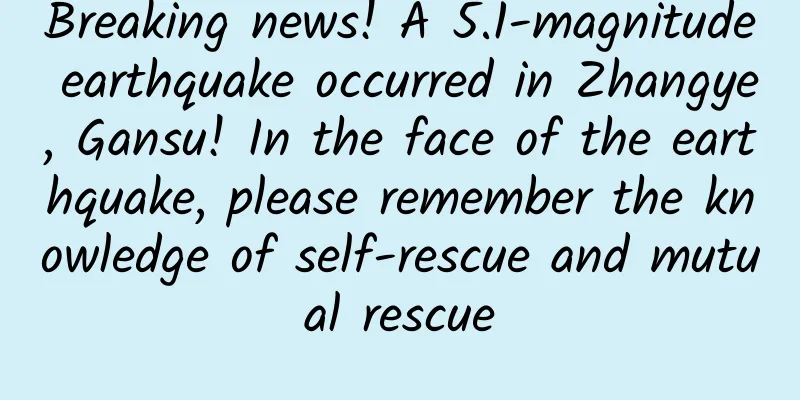It turns out that the Lantern Festival was the Valentine's Day for the ancients! Now that I know the truth...

|
When people today talk about the Lantern Festival, the first thing that comes to mind may be eating Lantern Festival dumplings and guessing lantern riddles. However, these customs did not come into being very early. Earlier, the ancients would worship the toilet god , become the "beast-faced boss" on the 15th day of the first lunar month , and eat a kind of lucky bun. Moreover, this day was also the "Valentine's Day" of the ancient Chinese . What are these? Don't worry, let's talk about them one by one. Dating was difficult for ancient people I want to be single every festive season In ancient times, women were often not allowed to go out casually, and had very few opportunities to date. The extremely lively Lantern Festival during the Lantern Festival became a good opportunity to find a date . From Ouyang Xiu's "The moon is at the top of the willows, and people meet after dusk" to Xin Qiji's "I searched for him among the crowds for a thousand times, and suddenly I turned around and he was there, in the dim lights", there are countless famous poems and lyrics describing lovers' dates during the Lantern Festival. The "Si Bu Congkan Chubian" reproduces the Yuan edition of "Collected Works of Ouyang Wenzhong". The sentence "the moon reaches the willow branches" is written as "the moon reaches" in this version and the Song Jizhou version. The writing "the moon is at the willow branches" did not appear until the Ming Dynasty, which should be a mistake made by later generations. This is not an exaggeration by literati. The Lantern Festival is indeed the ancient Valentine's Day . According to the Tang Dynasty poet Meng Qi's "Benshi Poetry", Princess Lechang, the younger sister of Chen Shubao, the last emperor of the Chen Dynasty, was particularly affectionate with her husband. On the eve of the fall of the Chen Kingdom, the couple was worried about being separated in the chaotic world, so they broke a bronze mirror into two halves and agreed that every year on the fifteenth day of the first lunar month, whoever had the chance would go to the market to sell the half of the mirror in his hand, so that the other could find him. When the Chen Kingdom fell, the two were separated. Princess Lechang sent someone to sell the half bronze mirror on the 15th day of the first lunar month as promised, and the price was extremely high. Onlookers thought it was inexplicable that such a defective product could be sold at such a high price. When the news spread everywhere, the husband got news of his wife. After some twists and turns, the two finally reunited . Perhaps influenced by this story, the already lively Lantern Festival has become more sour with the taste of love. The "Old Book of Tang: Chronicle of Emperor Zhongzong" records that in the fourth year of Emperor Zhongzong's Jinglong reign, the emperor and Empress Wei went out incognito to visit the Lantern Festival. When they were happy, they allowed the palace maids to wander around the streets. As a result, when they counted the next day, they found that a lot of palace maids had eloped that night. However, it seemed that Emperor Zhongzong and Empress Wei were not angry, and they continued to enjoy the lanterns happily the next day. Volume 12 of Sui Shi Guang Ji tells a very exaggerated story based on Hui Mu Shi Ying Ji. It says that in the second year of Tiansheng in the Northern Song Dynasty, a young man was visiting the Lantern Festival and picked up a handkerchief at the entrance of a temple. There were three love poems on it, which roughly meant that a young woman was looking for a partner. There is another paragraph at the end, saying that if you like me, please go to a certain place and wait for me on the Lantern Festival next year. I will definitely take a car with a "mandarin duck lantern" to find you. This was not picking up a handkerchief, but picking up a wife! The young man was so happy that he wrote three poems to express his desire to be single. In the second year, the young man really found a beautiful woman on the car. It turned out that she was a concubine of a nobleman, and she took advantage of the Lantern Festival to run out to find true love. As a result, the two fell in love and lived happily together. Of course, this story is so outrageous that it was almost certainly made up by a scholar who was extremely eager for a romantic encounter. If we encounter such a thing, we must be careful of telecommunications fraud. However, we can also read that in the eyes of the ancients, the Lantern Festival and dating are always linked together . The Immortal Emperor manages the toilet Don't hide from wealth and glory Many people have heard of the door god, the kitchen god, and the god of wealth, but they may not know that there is also a toilet god . Toilets are so disgusting, how much money would someone have to pay to be willing to be this stinky god? Modern people think toilets are disgusting, but ancient people thought that toilets are full of precious fertilizers. The gods in the toilet can make people rich. According to the book Yiyuan, which was probably written between the Eastern Jin Dynasty and the Southern Dynasties, one of the most famous generals of the Eastern Jin Dynasty, Tao Kan (who was also the great-grandfather of Tao Yuanming), relied on the toilet god for his luck. The book says that one day, Tao Kan was using the toilet when dozens of people suddenly appeared in front of him. What were these people doing? These people were actually gods. The leader was called Hou Di. He said that he admired Tao Kan very much and decided to give Tao Kan unrivaled wealth and glory in three years. The later emperor kept his word, and Tao Kan really became one of the most prominent generals in the entire history of the Eastern Jin Dynasty. A photo of the book "Yi Yuan" from the "Mi Ce Hui Han" collection in Tianjin Library. Of course, this is just a folk story. Tao Kan in the official history was a very hardworking man, but this story can show how powerful the toilet god was in the eyes of the ancients. The same book, Yiyuan, tells another story about toilets: Once upon a time there was a poor concubine who suffered bullying and insults from her husband and the wife, and did all the dirty and tiring work in the family. Finally, she died of despair on the fifteenth day of the first lunar month. But after her death, she was rewarded and was named the Zi Gu Goddess . Therefore, on the fifteenth day of the first lunar month, people would go to the toilet (pigsty) to offer sacrifices to her, shouting: Your husband is not at home, and his first wife is not at home either, Zi Gu, don't be afraid, please come out! If you feel that the things used for sacrifice seem to have become heavier, it means that the gods have really come down to earth. You can take the opportunity to predict whether your silkworm breeding will be successful this year, or ask whether other jobs will be easy to do. She will answer you seriously. The image of the book "Jingchu Sui Shi Ji" in the Baoyantang secret book. According to the book, the original custom on the fifteenth day of the first lunar month was to pour oil on the ointment to offer sacrifices to the door god or the silkworm god (a female deity), asking the silkworm god to drive away the annoying mice and bless a good harvest of silk cocoons. In later legends, the silkworm god and the Zigu god tended to be united, so the Zigu god also had to take care of silkworm affairs. Gradually, Zigu God squeezed out the Emperor of Heaven and became the most important toilet god in people's minds. Not only that, Zigu also became one of the gods most often invited by ancient people when they used spirit writing to ask for help . They would ask her about anything they couldn't figure out, and they simply used her as a chat. Until the Qing Dynasty, in many places, offering sacrifices to Zigu was still one of the important customs of the Lantern Festival . Cross-dressing man sings Colorful lanterns piled up to form a mountain Of course, the reason why the Lantern Festival has been passed down to this day is not because of the mysterious toilet god, but because of the fun lantern festival. This kind of lantern festival has a longer history than the Lantern Festival. It was particularly popular in the Sui Dynasty more than 1,400 years ago. The Biography of Liu Yu in the Book of Sui records that on the fifteenth day of the first lunar month, "drums blared to the sky, torches lit the ground, people wore animal masks, and men dressed in women's clothing ." For a time, "high tents crossed the road, wide curtains towered over the clouds, people wore fine clothes and beautiful makeup, carriages and horses were full, food and wine were served, music and music were splendid, and everyone was bankrupt, all for this time ." Looking at these descriptions, the streets are crowded with people, some wearing animal masks, some men wearing women's clothes, some playing musical instruments and singing, some eating and drinking to their heart's content, and some playing until they go bankrupt... In the feudal and conservative ancient times, such carnival scenes were rare. An image of the Baina edition of "Book of Sui". During the Tang and Song dynasties, the Lantern Festival gradually took shape, and the lantern festival became even more lively than that of the Sui Dynasty. For example, Volume 3 of the Records of the Chaoye tells of a lantern festival in the second year of Emperor Xuanzong's reign. It says that in that year, there was a 30-meter-high "lantern wheel" in Chang'an, with gold and jade on it, and 50,000 lanterns. Under the lantern wheel, thousands of women wearing extremely luxurious clothes and jewelry sang and danced for three days and nights. Such a scene is still shocking today. Lucky bun fried glutinous rice balls Eat and drink like a god Volume 11 of "Miscellaneous Notes on Sui Shi" quoted "Remaining Stories of Tianbao" and said that people in the Tang Dynasty would eat a kind of bun called " mianjian " during the Lantern Festival. There were vegetarian or meat buns, and various auspicious words about promotion and wealth would be written on paper or wooden strips inside the buns. After you get the buns, break them open gently and you will see this year’s exclusive blessing. "Sui Shi Za Ji" also records several special foods for the Lantern Festival, such as Ke Dou Geng (a soup made with mung bean powder), Yan Chi Tang (bean curd and meat soup), Yuan Zi (glutinous rice dumplings), Jiao Du (deep-fried glutinous rice dumplings), etc. The author believes that the most typical festival food is Jiao Du. Book image of "Sui Shi Guang Ji" from the "Shi Wan Juan Lou Collection". In the Ming Dynasty, Liu Ruoyu's "Zhuo Zhong Zhi" Volume 20 "A Brief Record of Food and Beverage Customs" said: "After the ninth day of the first lunar month, there will be lantern fairs, lantern buying, and Yuanxiao (Chinese rice dumplings). The making method is to use glutinous rice and fine flour, with walnut kernels and sugar as the filling, sprinkle water and roll it into the size of a walnut. It is what is called "tangtuan" in Jiangnan." The tangtuan here is actually no different from today's tangyuan . Tangyuan became a special delicacy of the Lantern Festival, and also borrowed the name of the Lantern Festival. Gradually, people also called tangyuan "Yuanxiao". The Lantern Festival is also called the Lantern Festival. Volume 35 of "Wanli Huguang General Records" called tangyuan "Dengyuan", following the same idea of word creation. In the past, the name "Yuanxiao" was mainly popular in the north, while the south called it "Tangyuan", which can be regarded as a dialect difference. However, the methods of making Tangyuan in the north and south are also different. Now, in many people's minds, "Yuanxiao" and "Tangyuan" can be regarded as two completely different foods. Want to show off your IQ of 170? Welcome to guess riddles together! The custom of guessing riddles during the Lantern Festival originated in the Southern Song Dynasty. In fact, guessing riddles was very popular in the Song Dynasty. There was even a form of folk art that specialized in making and guessing riddles. Before each guessing session, a song called "Congratulations to the Holy Dynasty" would be played. When guessing, there were various routines such as "zouzhi", "duizhi" and "diaoshuang", which was very complicated. A photo of the Song Dynasty classic "Records of the Capital" (the copy in the collection of Lianting). Guessing riddles is so fun that it is also played during the Lantern Festival. Volume 2 of Zhou Mi's "Wulin Jiushi" in the Southern Song Dynasty said that during the Lantern Festival, "some people use silk lanterns to write poems, sometimes with ridicule, and draw figures, hidden words and old Beijing jokes to tease passers-by." In Zhou Mi's writings, guessing riddles was just a game on par with writing poems, drawing figures, and telling jokes. It was not until the Ming Dynasty that it really became a representative custom of the Lantern Festival. Finally, I would like to share an authentic Song Dynasty riddle from Qian Chen’s Private Records (said to have been written by Wang Anshi himself). Here are two characters for you to guess: “If you add two dots to the character ‘目’, you cannot guess it as ‘貝’; if you lack two dots from the character ‘貝’, you cannot guess it as ‘目’.” (“貝” is the traditional Chinese form of “貝”, and it is also written this way in the radical; “欠” means lack. You don’t need any other classical Chinese or traditional Chinese knowledge to solve these two riddles.) Planning and production This article is a work of Science Popularization China-Starry Sky Project Produced by: Science Popularization Department of China Association for Science and Technology Producer|China Science and Technology Press Co., Ltd., Beijing Zhongke Xinghe Culture Media Co., Ltd. Author: Cleaner, PhD student in Exegesis at Nankai University Reviewer: Wang Hongzhi, Associate Professor, School of Humanities, Shanghai Normal University Planning丨He Tong Editor: He Tong |
<<: Personality determines the quality of old age! "Dandelion-type elderly" are more solid
Recommend
Is it better to let your hair air dry or blow dry? The answer may not be what you think
Audit expert: Zhang Yuhong Chief Physician of Der...
3 fission techniques to quickly acquire customers at low cost!
Since 2017, online traffic has become more and mo...
Retention rate? Several classic methods to keep more users!
An APP and its users will go through four stages:...
The three-level logic of brand slogans
As a marketing communication tool, brand slogan p...
By losing two tactics, NetQin has made a further strategic progress
Recently, Cheetah CEO Fu Sheng's article &quo...
Microsoft and TomTom launch smart maps for driverless cars
According to foreign media reports, Microsoft rec...
After “Yang Kang”, you need to pay attention to these things!
How to use medicine scientifically after infectio...
How to direct traffic to APP through WeChat mini games?
A few days ago, I was chatting with a friend who ...
Don't pick at these pimples! These pimples may be caused by a virus. Be careful, the more you pick at them, the more they will appear...
For small pimples on the skin Many people have th...
How to develop the financial accounting applet in Zhongshan and how to make the financial diary applet?
With the economic downturn, many people have begu...
Is global climate change causing the brain to become "out of control"?
Leviathan Press: In a previous article titled &qu...
4 methods and pain points of APP monetization!
If an app does not have a good commercial monetiz...
WeChat iOS 8.0.9 official version released: known issues resolved
[[411759]] WeChat iOS 8.0.8 official version was ...
Why do most startup marketing fail?
The author of this article will explain the mista...









